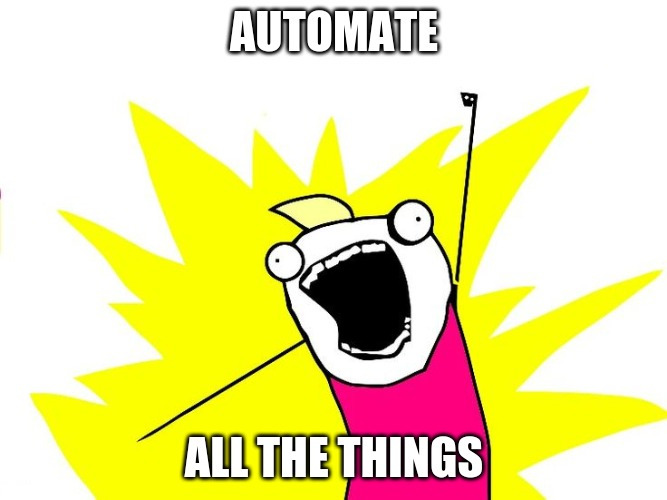Optimizing code reviews
Code reviews are an integral part of modern software development workflow and a highly debated one. A lot is said on why code reviews are important (e.g. Atlassian, Fullstory), how to do them (Google), what to look for (JetBrains), etc., etc. There’s no shortage of “internet wisdom” on the topic, but there’s one quite common flaw that might influence “your mileage” from code reviews quite significantly and cause them to harm your team’s productivity. In short, different aspects of the code (design, performance, security, style, naming, etc.) have a very different cost of making a mistake vs. cost of finding it during code review. Let’s take a look at how this affects the review process (“what to look for”) and a few techniques that can help improve it.
Start with Why
Let’s follow the advice of Simon Sinek and start by recalling why are we doing the code review. I’ll take the liberty to shortcut through the detailed list of benefits of code review, and put it into one nice and concise sentence:
The ultimate goal of code reviews is to improve team productivity.
Now, don’t get me wrong, things like better code quality, faster knowledge dissemination, developer satisfaction, etc. are important, but they are all means to achieve the goal, not the goal itself. They either contribute to productivity directly - e.g. fewer bugs in production - or enable some qualitative “features”1 that ultimately also contribute to productivity - such as developer stress levels.
There’s one thing though - productivity is essentially “the amount of value produced in a unit of time”. When code reviews are adopted by the team, some time is spent on code reviews. However, the code reviews themselves rarely, if ever, produce the “value”2 - they capture issues in the already developed code. In this aspect, they are similar to tests - don’t add anything to the business value, but aim to catch potential issues that might prevent from capturing this value.
So, we can now clearly see that on one hand-code reviews improve productivity, but on the other hand, they harm productivity ![]() . In situations like these, there’s some balance point where the net effect is best. Finding the balance becomes an optimization computation when the problem can be formalized or an art in all other cases. Unfortunately, things like “productivity” and “value” (save for developer stress) are quite hard to formalize, so code reviews fall into the “art” bucket.
. In situations like these, there’s some balance point where the net effect is best. Finding the balance becomes an optimization computation when the problem can be formalized or an art in all other cases. Unfortunately, things like “productivity” and “value” (save for developer stress) are quite hard to formalize, so code reviews fall into the “art” bucket.
The Art of War finding the balance
… or the “How” part.
What we’re trying to do is to find the balance between effort spent in code reviews (both on the reviewer and the author side), and the “improvement” of the code that comes from it. Again, a lot is said on the topic already, and I won’t repeat the “prerequisite” things like “define the team norms”, “agree on the code style”, “set up a framework for reviews” and so on. There’s a very good and concise write up by one of my former colleagues: “How to prevent code reviews from slowing down your team”, definitely check it out.
There are three techniques that (in my opinion) are the most overlooked, and the most efficient:
- Focus - do the important things, don’t do the unimportant ones (sincerely yours, Captain Obvious).
- Automate - let the computers run the
worldreview. - Distribute and delegate - you’re not doing it alone.
Focus
This sounds obvious at first, but please bear with me. The simple (and trivial) idea is to focus on an “important” parts and leave unimportant be as they are. The non-trivial part is that there’s no single definition of “important” and “unimportant” aspects; moreover, they might be dramatically different across organizations, teams and individuals3. However, some relative order can be established - for example, adherence to an external API contract is much more impactful compared to code style.
Broadly, the aspects can be categorized into four groups:
Critical - mistake/bug here might have severe consequences and is hard to detect: security, adherence to the chosen architecture and design, algorithms performance (aka asymptotic complexity), concurrency issues, configuration, backward/forward compatibility.
Major - issues in this group have a major impact, but are either easy to spot or can be caught by the comprehensive test suite: outright functional defects, correctness at the edge cases, validation, adherence to the standards, database migrations.
Minor - something that impacts the application, but you can imagine going to production without it and still fulfilling the needs: logging/monitoring/traceability, comprehensiveness of tests, readability, error handling.
Nitpicks - something that has a limited impact on the code quality and no impact on the application/business function: naming, code style, indentation (aka tabs vs. spaces holy war), typos, documentation, testability.
This is by no means a comprehensive and final list - some teams might have a different approach, but it should give a general idea of what’s what. For example, your team might value near-100% test coverage, self-documented code and full support for distributed code tracing - in such cases the corresponding items should move up or down the “importance” scale. But let me emphasize one thing: the more obvious issues are not the most important ones in code review - the subtler ones are much more useful to the author as well as future maintainers.
Automate
Another technique is to use the cold, rational machines to do the review. This helps in two ways:
- Computers excel at boring, repetitive tasks - the ones humans hate. So your human reviewers are relieved from reviewing those code style/formatting/order of imports/etc./etc. stuff and can focus on something important (see the section above).
- It removes human touch from the simplest (and thus most obvious and annoying) comments - such as code formatting - thus reducing the tension and stress levels in the team.
So, the thing is, the more you automate - the better.

However, some thought needs to be put here as well - certain things can be automated, but the effort vs. benefit might not be good enough. For example, at Redmart we had Sonarqube enabled on all the repositories. It was doing its job fine for the teams using Java, but my team(s) used Scala - and we quickly realized that Sonarqube produces more false positives than valid warnings, and eventually disabled it in our repositories.
Anyway, here’s something that can be automated:
- Code style - use autoformatter, e.g. scalafmt, gofmt or your IDE formatter. Make sure that all team members (and ideally the whole organization) use the same formatter configuration.
- Static code analysis - tools like flake8, scalastyle, Sonarqube and the likes help you capture more “semantic” errors/issues - like undefined variables, bad naming, or high cyclomatic complexity.
- Test comprehensiveness - many services report code coverage (e.g. codecov) and they can be easily integrated with your CI tools and version control service (Github, GitLab, Bitbucket) to block merging unless code coverage targets are met.
- Services like AWS Code Guru or deepcode aim to provide even more insightful automatic reviews by utilizing AI and ML.
- Performance reviews can theoretically be replaced by an automatic performance stress-test, so tools like gatling, industry veteran JMeter, or locust, integrated with your Continuous Integration service can help with that.
- Let your compiler work for you - leveraging rich type system can let your compiler do the correctness check for you - the code with an error won’t even compile.
Delegate
Software development teams rarely consist of just two developers (although, I’ve been in such a team for some time). This means that there is more than one person to do the review. So, having multiple people who can review something can be utilized in multiple ways. The most common is to just increase the thoroughness of the review - i.e. just have more eyes on the code - to (theoretically) catch more issues.
The less obvious one is to distribute and delegate the parts of the code review among multiple reviewers. This becomes a sort of trivial and natural in cases where certain skills are only found in certain individuals in the team. But even when it is not the case, delegation might help a lot, and even help with team building, to some extent.
In essence, I’m talking about distributing reviewing different aspects of the code to people of different seniority and expertise. This allows more senior people to focus on the more impactful parts, and still have more junior folks to play an integral and important role in the code review process. Simply put
Lead/Staff/Principal engineers review the high-level aspects (security, design, etc. - see the “Critical” list in the Focus section).
Senior/Middle engineers dig down and watch for algorithmic complexity, bugs, alternative implementation, etc.;
Junior guys focus on naming, code style, existence and quality of the documentation and so on.
Some care needs to be applied here as well - the distribution and allocation must not become rigid and exclusive - you don’t want the quality of your code reviews to decline just because your only lead engineer went on vacation, or left the company. Even in “normal” conditions, that guy might become overloaded with reviews - and harm either his productivity or the team.
Conclusion
Code reviews aren’t free lunch (there’s no such thing anyway). The effort spent on reviewing the code can be as well spent on something that has a business or technical merit - be it new features, bug fixes, or refactoring and adding more tests. Moreover, the people who are better qualified to do the reviews, are also your more senior people - so reducing the load on them can help in multiple ways - from more stuff built by them, to better knowledge sharing, public presence and intellectual property building. In this post, I’ve described techniques that helped me a lot to reduce the load on myself - focus, automation and delegation - and I hope you find it useful.
Thanks for reading, and let let me know what you think on Twitter.
Such as the ability to go on vacation and not worry about being pulled back due to the production issue ↩︎
The definition of value for a software project is vague, but for simplicity let’s say it is “features shipped” ↩︎
For example, one might say that readability is not that important - unless it’s a total mess of course; on the other hand “readability matters” is one of the commandments of the “Zen of Python” - so there’s an entire language community that would disagree. ↩︎


